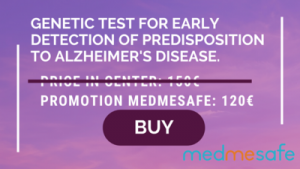Are you worried about your memory or that of a loved one?
Alzheimer’s is a neurodegenerative disease that can affect anyone, and the earlier it’s detected, the better the options for treatment and care. In this article, we present the keys to knowing if you have Alzheimer’s, as well as some tips for preventing and detecting the disease in time.
What is Alzheimer’s?
Alzheimer’s is a neurodegenerative disease that affects a person’s memory, thinking, and behavior. As the disease progresses, brain cells die and there is a greater cognitive decline. Currently, there is no cure for Alzheimer’s, but steps can be taken to delay its progression and improve the quality of life for patients.
How to tell if you have Alzheimer’s? (Detecting Alzheimer’s Disease)
If you suspect that you or a loved one may be experiencing Alzheimer’s symptoms, it’s important to seek medical help as soon as possible. Although detecting Alzheimer’s can be difficult in the early stages of the disease, there are some warning signs that can help you identify if you are at risk. Some of these signs include:
- Short-term memory loss: Forgetting newly learned information or important dates or events.
- Difficulty performing daily tasks: Difficulty performing simple tasks like dressing or preparing a meal.
- Changes in behavior: Experiencing mood changes, loss of initiative, or social isolation.
- Problems speaking or writing: Forgetting words or having difficulty expressing oneself.
- Disorientation in time and place: Not remembering where they are or what time it is.
If you’re experiencing any of these symptoms, it’s important to seek medical help as soon as possible. A doctor can conduct an evaluation to determine if your symptoms may be caused by Alzheimer’s or another disease.
How to prevent Alzheimer’s?
Although there is no sure way to prevent Alzheimer’s, there are some measures you can take to reduce the risk of developing the disease. Some of these measures include:
- Exercising the brain: Keeping the brain active and exercised can help reduce the risk of Alzheimer’s. Reading, doing puzzles, learning a new language, or playing a musical instrument are activities that can help keep the brain in shape.
- Maintaining a healthy lifestyle: Maintaining a balanced diet, exercising regularly, and avoiding tobacco and alcohol can help reduce the risk of Alzheimer’s.
- Controlling risk factors: Some risk factors such as hypertension, diabetes, and obesity can increase the risk of Alzheimer’s. Controlling these factors can help reduce the risk of the disease.
How to detect Alzheimer’s early?
Early detection of Alzheimer’s can be key to effective treatment and care. If you suspect that you or a loved one may be experiencing Alzheimer’s symptoms, it’s important to seek medical help as soon as possible.
At MedMeSafe.com, we offer a genetic test for early detection of predisposition to Alzheimer’s. This test can help you know your risk of developing the disease in the future. Additionally, we currently have promotions and special offers on this product. You can find more information on our website at the following link: https://www.medmesafe.com/en/genetic-test-for-early-detection-of-predisposition-to-alzheimers.
Remember that, although this test can be very helpful, it does not replace a medical consultation with a specialist in neurology to analyze the result. If you have any doubts or concerns about your brain health, it’s always important to consult with a healthcare professional.
In conclusion, knowing if you have Alzheimer’s is not something you can easily discover on your own. It’s important to pay attention to early signs and symptoms, talk to your trusted doctor, and consider getting a genetic test to detect predisposition to the disease. Knowing your risk can help you take preventive measures to maintain good brain health.
References:
Alzheimer’s Association. (2021). Alzheimer’s and Dementia: Symptoms and Diagnosis.
National Institute on Aging. (2021). Alzheimer’s Disease Fact Sheet. Recuperado de https://www.nia.nih.gov/health/alzheimers-disease-fact-sheet
Mayo Clinic. (2021). Alzheimer’s Disease. Recuperado de https://www.mayoclinic.org/diseases-conditions/alzheimers-disease/symptoms-causes/syc-20350447
Clément Destoumieux
PRESENT: + 20 years in complex legal and IT projects in France, the UK and Spain Expert in BioExpert exclusive network of experts in the sectors of life science and investment. Startups coordinator of ANIS (Spanish Association of Health Journalists) Lider ehealth in Asociación Española de Start up Active member of ASEBIO (Leading Spanish Biotech Association) PAST: Sociedad Española Informática de la Salud MBA in Ecole Des Mines – Nantes Master Degree in Ipag Business School in Paris

